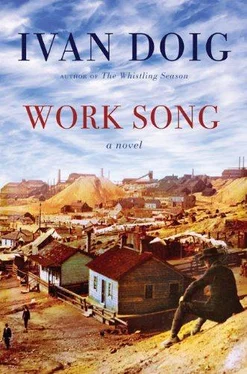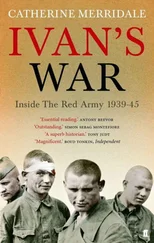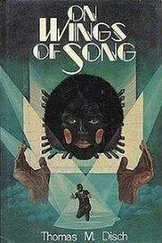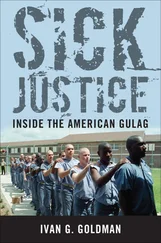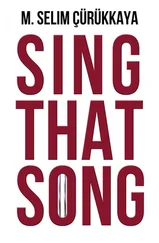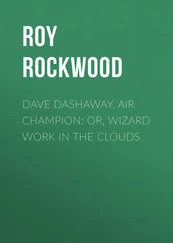Window men.
I would know the species anywhere, but in Chicago they had been rife enough to be a civic nuisance. Private detectives spying on lovers who happened to be married to other people. Pinkerton operatives lurking on some mission. Plainclothes policemen trying to keep an eye on the mob, or mobsters trying to get something on the police. Sometimes it seemed every Chicagoan was trailed by another, half a block behind. And whenever the one in front paused to tie a shoelace or buy a newspaper, the one trailing had to evince sudden interest in the nearest store window. The duo in the mirror-why should I rate two?-still were rapt over pets.
As I committed their sizable outlines to memory, another mental image was jostled: these two together were a near fit to the worst of those shadows that had followed me from wakes. But that was too much imagination. Wasn’t it?
Casually as I could manage, I walked back to the library, the music stands feeling like an armful of lightning rods with a storm on the horizon. When I reached the big front door, I opened it slowly so that I could see behind me in the glass. The window men were gone, naturally.
THAT EVENING AFTER SUPPER, I knocked on Griffith’s door.
The shuffle of carpet slippers, then the door flung open and Griff stood there in his long underwear and workpants, like a watchman roused by an out-of-place noise in the night. “What’s up, Morrie?” Down at his side, in his right hand, something sharp glinted. “Need a new notch in your belt?”
For the second time that day, my feet felt planted in quicksand. “I didn’t mean to intrude, I’ll come back another-”
“Naw, step on in.” The pointed instrument cut a circle in the air as he indicated a table and chair crammed into the far corner of the room. “Fixing Grace’s purse strap for her.” Ushering me in, he went on over and put down the awl he was holding, atop the leatherwork. “Guest gets the chair.” He perched on the edge of his bed, toes of his slippers barely reaching the floor. “What’s on your mind? You look spooked.”
“This will sound silly, but I think I’m being followed around town.”
Griff perused me, his wrinkles wrinkling even more. “Let’s get Hoop in on this.” He banged the heel of his fist on the wall, and shortly Hooper came in, bringing his own chair.
I described to them that morning’s experience, and the unlikelihood that the two idlers were pet fanciers. “Keep this to yourselves, please. I don’t wish to worry Grace about this.”
“Or have her kick you out of here on your can,” Hoop said.
“Well put.”
Griff hopped off the bed, went to the window, and pulled down the blind. “Tell me this,” he intoned, turning to me. “When you lit down from the train, was there a couple of bruisers hanging around?”
“Big and bigger,” Hoop specified.
“Beefier than ordinary, yes, now that you say so, there was such a pair at the depot.”
“That’s them,” Griff said. “Anaconda’s goons. The one big enough to eat soup off the top of your head is Typhoon Tolliver.”
I felt as if the seat of my chair had just pinched me.
Hoop was saying, “Jim Jeffries flattened him-”
“-in the second round of the title bout, right hook to the jaw,” I finished for him. “What on earth is he doing in Butte?”
“Beating people up,” Griff had no trouble answering that. “The Anaconda Company don’t play pattycake.”
“But-” Some questions scare off words. Why was I a candidate for a beating from an ex-heavyweight pug?
Hooper answered that without it being asked. “That bunch in the Hennessy Building sics the goons on any union organizers who come in from the outside.” He and Griff looked at me critically.
I shook my head.
“Especially anybody working for the Wobblies,” Griff prompted.
I shook my head harder.
“Somebody who’d lay low until the right time,” said Hoop.
“Then stir things up like poking a hornets’ nest,” said Griff.
“Anaconda don’t like that kind of thing,” Hoop added.
Another shake of my head, as much to clear it as anything else. “I am not any kind of an organizer, believe me. I simply came here to get ri-to find decent work.” Both old men watched me mutely. “The goons, as you call them, are wasting their time on me.”
One or the other of my listeners, like ancients who had heard it all before, spoke up. “You better hope they get tired of it.”
THE NEXT DAY WAS SUNDAY, day of rest for the library, but not for the boardinghouse. Scarcely was I seated for breakfast, wondering where the others were, when Grace forged out of the kitchen all but wrapped in a tie-around apron over a nice dark dress. Along with my plate of sidepork and eggs, she delivered with a flourish:
“I wondered if you might like to go to church.”
“Church.” I hadn’t meant for it to come out quite like that, but it sounded as though I was trying to identify the concept.
Hooper came through the doorway, also dressed in surprising Sunday best and smelling of musky cologne. “What this is, Griff’s filling in with the choir. They’re hard up.”
“Ah. And bringing his own audience, insofar as it can be conscripted?”
“He’ll be in much better voice if he sees us there, he happened to mention,” Grace coaxed with a nice example of a Sunday smile.
“He can stand all that kind of help he can get,” Hoop chipped in.
I put up my hands. “I know when I’m outnumbered.” Obligation takes strange shapes. Back in Casper’s earliest bouts, I had mastered the tactic myself of “papering the house,” as it was called, by giving away tickets by the handful if necessary to fill the seats of the arena. If Griffith dreamed of a sellout crowd for his star turn with the choir, I understood intrinsically.
THE SNUG REDBRICK CHURCH with its peaked hat of cupola looked as if it had been smuggled in from a vale in Wales, and no sooner had Grace and I and Hooper slid into seats at the back of the congregation than the creased little minister, peering over half-moon eyeglasses like a veteran counter of crowds, nodded to himself and launched into prayer. In Welsh. Evidently Grace had not anticipated this any more than I had, both of us trying to keep a straight face at not understanding a word of what plainly was going to be an hour of many hundreds of words. Actually, some time into the minister’s spate my ear figured out the repeated invoking of “Iesu Grist,” and I sat there caught up in the wayward notion of Christ as grist, the mills of faith grinding fine the belief in a clear-eyed savior at that moment across half the world. Sunday certainties, which left only the rest of the week.
The praying rolled on like thunder until the minister reached a final crescendo of syllables that sounded like tragwyddoldeb!
“Eternity!” Hoop translated to the other two of us in a hoarse whisper, and that was definitively that.
“Welcome, all ye, the accustomed and the new faces.” The surprise lilt of English from the minister sent Grace and me melting toward each other in relief. Not much taller than his pulpit, the elderly man of faith again peered around the church as if counting the house, this time shook his head instead of nodding, and declared: “A sufficiency will be heard from me soon enough. Let us get on with the singing.” With that, the male choir filed up, all in severe black suits and blinding starched white shirts, two dozen strong, Griff at one end, proud as a parrot. Church or not, he sought out the three of us with a broad wink, welcoming us to the occasion he plainly saw as the Welsh Miners’ Choir of Butte, starring Wynford Griffith.
The choir director, burliest of the bunch, stepped from the ranks, gave a steady bass hum, which was picked up by the others in a communal drone that seemed to vibrate the building. Then, as if in one glorious voice the size of an ocean’s surf, they swept into hymn after hymn. I sat there enchanted, Grace swaying gently next to me. Music makes me almost willing to believe in heaven.
Читать дальше
